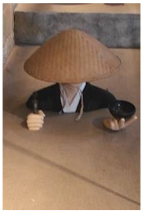 The premise of this blog is, of course, that throughout time and space, every culture has witnessed the presence of a Holy Beggar. Whether individuals or institutions, the beggar is the "canary" in a socio-economic context.
The premise of this blog is, of course, that throughout time and space, every culture has witnessed the presence of a Holy Beggar. Whether individuals or institutions, the beggar is the "canary" in a socio-economic context.I have introduced you to my begging buddies who provide this function within the context of their cultural milieu.
Now, I'm going to tell you about two situations that will indicate how complex it is to work outside one's own cultural contexts and across generations.
I am immediately reminded of A Connecticut Yankee in King Arthur's Court, the first story, or so says the author, Mark Twain, about time travel in human culture.
Young Chinese American Storyteller at a (Predominantly) Jewish Community Memorial
The first example presented here is based on an occurrence last week at the yahrtzeit (Yiddish: lit. "time of year", annual memorial) of the beloved Theodore Bikel held by family and friends, and accessible (as was dear Theo) to all. The venue was the great community center hall (former Sinai Temple synagogue) of Craig Taubman's multi-cultural but Jewish-inspired Pico Union Project (PUP) ain the Pico/Union section of LA.
The event was not targeted to be "sponsored by" or even to "officially" benefit anything or one else, but it was mentioned in the midst of some reverential comments that if people wanted to make a donation to Mazon, the Jewish organization that addresses hunger throughout the USA, there were some envelopes on the pews. Nothing more was said about it from the stage for 2 hours.
Toward the end of a very hamish (Yiddish: NOT like "ham" but more like that sweet fellow "Haim") gathering of folks in the folk music community, a few in film and TV, some lefties and an even fewer heads of Jewish community organizations, Peter Yarrow sang songs about hope and inclusiveness of immigrants. He invoked the melting-pot-ness (Bikel didn't believe in it) of our current political dilemma. Folks on the bimah (Hebrew: stage) were taking turns doing solos, and we all joined in on the choruses. Try and stop us!
In the sweet Kum-ba-Yah-nis of the moment, a younger fellow with an Asian face pokes his head through the crowd on stage, takes the mike, and introduces himself as Jason Chu, the PUP Storyteller. "I'm a Chinese kid from Delaware who didn't know Theodore Bikel, but I am moved by what I'm experiencing here today. He spoke first quietly through the humming that honored his words and remained at this level, suggesting "let's all get together, and do what's right", etc.And then ...
Kapow! Nothing.
My friend Linda and I, both of us who have rattled the begging bowls in our professional lives, simultaneously turned to each other and, in astonished soto voce said, "He didn't ask for money! He had 'em!"
As the formal program ended, with people chatting and leaving their seats, one woman strained her voice to be heard ... "If you have those Mazon envelopes, please give them to ..." and named a few people, none of whom were necessarily stationed in a specific spot.
Linda and I were invited to join the Pals-O-Theo as they adjourned to the social hall for refreshments, where we found Jason and brought to his attention this observation. I asked him if he could hear the silence, the anticipation, the power of his voice? "These folks expect / want to give. Jewish people give at times like these."
He said that it was never his intention to ask for money. We explained the missed opportunity, especially since MAZON was mentioned previously. He didn't have to bring it up out of the cold. I plan to meet Jason at another time to discuss this further. He can turn his story-telling prowess into fund raising and to develop philanthropic contributions for PUP.
The great fundraisers are all story-tellers, much as are lawyers. It is at the heart of a great persuasive "argument" ... the difference is that the intention to wield the power is clearly to channel / convert the listener's cache of emotions toward taking some specific action.
In Compelling Conversations for Fundraisiers, authors Laurie Selik and Janet Levine call this the "pivot". In skiing, it's what one must do when approaching a mogul (a bump/hill of snow, usually found in a series, caused by many people skiing in the same area). I call it Hooo-pA! It is impossible to ski through the gullies on those long boards. So, when you're at the top of the bump, while the view may be lovely, for the sake of need to get down the mountain, take the opportunity at hand (actually, foot!) to make a turn, or slow down, or other adjustment. This is a truly powerful place to be if one uses it correctly!
To you, beloveds of The Holy Beggar, please do not forget to pay attention, and.
Remember
No matter what ...
Don't forget to
ASK FOR THE MONEY!

Thank you for sharing your experiences and insights from the Bikel gathering. hat's a great story! I wish I had been in that room too. My father idolized Bikel from a distance for all the "lefty" and cultural reasons you would expect. While many knew him for his role in Fiddler, he left a much larger cultural footprint. https://en.wikipedia.org/wiki/Theodore_Bikel
ReplyDeleteAnd thanks for mentioning the importance of the pivot. While Jason's "good mistake" can be attributed to both innocence and purity, idealists and artists also live in a material world. Balance, as ever, remains crucial. Yet good causes and good project require energy, and in our material world, money provides some of that energy. Or so it seems to me.
Shalom,